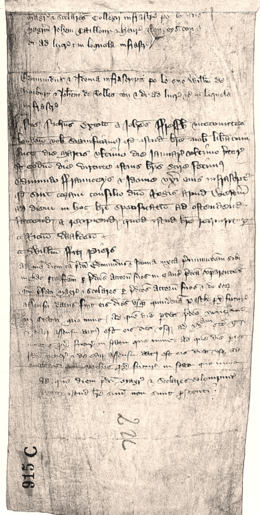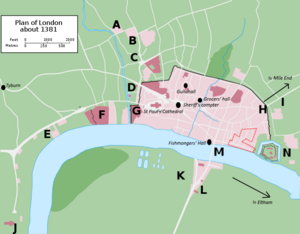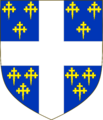Nicholas Exton facts for kids
Quick facts for kids
Nicholas Exton
|
|
|---|---|
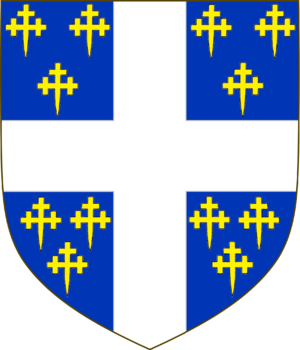
Arms of Exton, blazoned Azure a cross argent between twelve crosses crosslet fitchée or.
|
|
| Lord Mayor of London | |
| In office 1386–1389 |
|
| Personal details | |
| Died | 1402 |
|
TNA, document SC 8/19/915C: In 1385, King Richard II issued this summons to the sheriffs of London, Nicholas Exton and John Fresshe, requesting them to find and to bring Edmund Fraunceys and his wife Idonia before the King's council on a charge of attempting to defraud University College, Oxford.
|
Sir Nicholas Exton (died 1402) was an important English merchant from the Middle Ages. He was a leading member of the Fishmongers' Company, a powerful group of fish merchants in London. He was chosen twice to be the Mayor of the city. This happened during a difficult time when King Richard II was ruling.
Not much is known about Exton's early life. However, he became known for strongly defending the rights of his guild. This led to some problems when he spoke out against the Mayor at the time. He faced a fine and was briefly put in prison. Things changed for him when Nicholas Brembre, a close friend, became Mayor. Brembre was a strong supporter of the King.
At this time, King Richard II was having big disagreements with some powerful nobles. These nobles were called the Lords Appellant. They managed to take away some of the King's power. This also weakened Brembre, who was later executed by the Appellants because he supported the King.
By then, Exton had become Mayor himself. He tried to keep London neutral during the fights between the King and the nobles. It seems he also gained some benefits during the Appellants' time in power. Some people in London were not happy with him, but parliament later cleared him of any wrongdoing. Exton was married at least twice and died in 1402.
Contents
London in the Middle Ages
London during the late Middle Ages was a very important city. It was the biggest port, market, and employer in England. It handled more than 60 percent of England's trade with other countries. Controlling London was very important for any king. The city gave kings access to royal administration, justice, and Parliament.
However, Londoners were also unhappy about the King's poll taxes. These taxes, collected between 1376 and 1381, caused a lot of trouble for the people of London.
How London was Governed
London was run by its successful merchants. They were organized into different trade groups called Guilds or "misteries." These guilds were very rich and powerful. They formed the upper class in the city's politics. They governed through the Common Council and through officials like Aldermen, Sheriffs, and the Mayor.
London's politics were often unstable. Even though some thought King Richard II liked London more than other places, it's likely he didn't like Londoners much, and they didn't like him. But they needed each other. The King relied on London's wealth and loans from its merchants. The city needed the King to protect its trade and freedoms.
In the 1380s, London's politics mirrored the national conflicts. The city was divided between those who supported the King and those who opposed him. These divisions were not just about national politics. They were also about deeper struggles over how the city should be governed. Nicholas Exton first appears in records during this time of crisis.
Exton's Political Journey
We don't know much about Nicholas Exton's birth or early life. In 1364, he was part of a disagreement within the Fishmongers' Guild. He was against the powerful Sir Robert Turk. Because many guild records are missing, we don't know much about his daily political activities. He became a Member of Parliament for Middlesex in 1369.
London faced political chaos after the Good Parliament in 1376. This led to big changes, like yearly elections for aldermen. This new system caused instability in the city government.
King Edward III died in 1377. By this time, Exton was an important citizen. In 1381, the Peasants' Revolt broke out. This was a huge uprising across England. London was a main target for the rebels. Some of Exton's fellow Fishmongers even let the rebels into the city.
Exton helped some Londoners involved in the revolt get royal pardons. This included Walter atte Keye, who had threatened to burn down the Guildhall. The Mayor, William Walworth, who was also a fishmonger, helped King Richard gather an army against the rebels. Walworth famously killed the rebel leader, Wat Tyler. Nicholas Brembre was also with them. Walworth and Brembre were knighted for their actions.
After the revolt was crushed, Exton became more involved in city government. In 1382, he was elected alderman for Billingsgate Ward. He held this position seven more times until 1392.
By the early 1380s, Exton was an active spokesperson for the Fishmongers' Company. His guild had a monopoly on selling fish wholesale. The Church required people to fast from meat on many days, making fish a very important food. This made the Fishmongers' Guild very powerful in London.
Exton also gained influence through the King's support. He got many profitable jobs, like collecting wool customs and taxes at the Port of London. He also became Mayor of the Westminster Staple. These jobs brought him money and power. As a London citizen, he could trade beyond his guild's rules, which he likely used to his advantage.
Exton and Geoffrey Chaucer
Exton's job as a tax collector was common for important London merchants. The famous poet Geoffrey Chaucer had been appointed to control customs in 1374. So, Chaucer likely oversaw Exton's work as a tax collector. Both Exton and Brembre supported the King. King Richard likely tried to create a "royalist" group within London's government.
It's even suggested that Chaucer based the merchant character in his The Merchant's Tale on someone like Exton. Chaucer seemed to favor Exton's group in the Common Council. They were brought together again in 1386. This was because a petition in parliament asked to remove all customs controllers who had lifetime appointments, like Chaucer.
Opposing John Northampton's Reforms
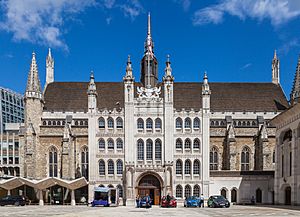
After the Peasants' Revolt, the reputations of the current city leaders were damaged. This allowed a new, radical Mayor, John Northampton, to be elected. Northampton was Mayor from 1381 to 1382. He had a very popular plan to break the Fishmongers' monopoly. This would lower fish prices for Londoners and open markets to less wealthy traders.
Exton, however, wanted to keep the city's existing price controls. He and other fishmongers argued that other foods like bread and wine also had monopolies. They didn't see why their practices should be singled out. Exton's group was sometimes called the "capitalist party." Smaller guilds, like craftsmen, wanted free trade. The victualling guilds, wanting to keep their monopoly, were hostile to foreign traders. Fishmongers would even seize fresh fish from foreign fishermen, sell it at high prices, and pay them back whenever they felt like it.
Northampton's time as Mayor was full of violence. Riots and street fights were common between members of clothing guilds and victualling guilds. But Northampton eventually brought free trade for fish in 1382. Exton appealed to the King for his guild. Northampton immediately accused the fishmongers of stopping London from having "unity, love, and harmony." Exton claimed Northampton was biased against them.
Northampton's mayoralty was a disaster for the fishmongers. He took away their right to sell fish retail and their right to hold city office. Exton and Northampton became bitter enemies. Exton joined Northampton's opponents, led by Nicholas Brembre. Exton's strong defense of his guild led him to make harsh comments about his opponents. In 1382, it was recorded that Exton used "insulting words" towards Mayor Northampton. Because of this, Exton was removed from his alderman position less than a week later. He also lost his city citizenship, was fined, and forced to leave London for a short time.
However, just a month later, in September 1382, Exton was back. He continued to argue that fishmongers should have the same exclusive rights as other companies. Northampton's supporters then accused Exton of going against London's traditional freedoms. They said this was "a clear harm to all citizens."
Exton's fellow guild members, however, praised him for standing up to Northampton. One even said they should "put their hands under the feet of Nicholas Extone for his deeds and words on behalf of the mistery."
Nicholas Brembre's Mayoralty
John Northampton served two terms. In 1383, he lost the mayoral election to Nicholas Brembre. Brembre was Mayor for the next three years. He likely won by filling the Guildhall with his armed supporters. Lawlessness continued in the city, and King Richard II may have helped Brembre win to stop unrest. Soon after, a shoemaker was executed as an example, with the King's support.
Within months, Northampton was on trial for sedition (trying to cause rebellion). Exton attended, supporting Brembre. Brembre, a member of the Grocers' Company, was sympathetic to the Fishmongers. Early in Brembre's time as Mayor, Exton asked the Common Council to overturn his 1382 condemnation. His appeal was successful, and records of his conviction were removed.
Exton was soon elected Sheriff of London. In 1385, he was again elected alderman for Billingsgate. The parliament in October 1385 was politically tense. Members of Parliament tried to remove King Richard II's favorite, Michael de la Pole. Exton was part of a group of merchants who asked the King to execute John Northampton.
The King asked for a war tax. Exton was appointed a tax collector in January 1386. He was told to collect and keep the money, ensure it was used only for military activities, and report back to Parliament. By Easter, he and his fellow collector had gathered about £29,000. For this, he was paid £20 and £46 for expenses. He also got free boat use on the River Thames. In October 1386, Brembre's three terms ended, and Exton was elected Mayor.
Twice Mayor of London
The years from 1387 to 1390 were very important for London. The Mayor was the most important person in the city's government. Exton's election as Mayor would have been a grand event with much pageantry. There were big processions with guilds, court members, and apprentices, all in their colors with banners and music.
The war with France was going badly, and there was a financial crisis. The King was becoming unpopular. There was a serious threat of French invasion. In September 1386, a French fleet was expected to sail, and a 10,000-strong army surrounded London to protect it.
First Term: 1386–1387
Exton became Mayor of London on October 13, 1386. Within weeks, he arranged a large loan of £4,000 to the King from the city. This loan was to be repaid early the next year. Exton's election also helped the fishmongers keep control over wool tax collection.
Exton had to lead the city through a very difficult time in English politics. At the "Wonderful Parliament" in November 1386, the King's opponents, the Lords Appellant, tried to limit King Richard's power. They wanted him to be accountable to a council of nobles. Some historical accounts suggest the King planned to arrest or ambush some of them. Exton, it is said, discovered the plan and warned Parliament. Some sources even say the plot failed only because Exton refused to be part of it.
Exton and Brembre continued to work closely. Exton kept prosecuting and imprisoning their shared enemies. With Exton running London, Brembre focused on national politics, representing the city in Parliament. They continued their efforts to undermine John Northampton. In March 1387, Exton had Northampton and his friends imprisoned. When it seemed the King might pardon Northampton, Exton strongly opposed it.
That same year, under Exton's watch, the Common Council ordered the burning of John Northampton's reform laws. This was done publicly outside the Guildhall. This book, called the Jubilee Book, was seen by some as good laws for the city, and by others as against the city's old customs. Its destruction made Exton seem to be part of Brembre's harsh actions.
Exton generally avoided public debate. He focused on strengthening the power of his and his allies' guilds. This included continuing attacks on foreigners in the city. In July 1387, to avoid "shame and scandal," it was forbidden for any foreigner to become an apprentice in a guild.
In September 1387, the King wrote to Exton, saying he was happy that "good and honorable men" (Hugh Fastolf and William Venour) had been elected Sheriffs of London. These appointments were seen as very political.
Second Term: 1387–1388
In October 1387, Exton was re-elected Mayor. The King helped this happen by threatening to stop his officials from approving any candidate he thought would not "govern the city well." The King returned to London in November, seeking revenge on his opponents. Exton met the King outside the city gates with the Mayor and aldermen, all dressed in the royal colors of red and white.
It was important for the King to get London's support. Exton tried to help by asking all the craft guilds to swear an oath to "live and die" with Richard. This oath also included a denunciation of John Northampton. This showed how Exton's support for the King was linked to his guild's desire for monopoly.
However, Exton could not help the King raise an army. He told the King that Londoners were mostly craftsmen and merchants, not soldiers, and could only defend the city itself. The King then sent an arrest warrant for the rebel Lords, and it was Exton's job to carry it out in London. But Exton "quailed before such a task" and decided the city should not execute such a warrant.
On December 20, the Lords Appellant defeated the King's supporters at the Battle of Radcot Bridge. This shifted power dramatically. Exton then allowed the Lords to enter the city, but only after their victory was certain. Exton may have personally greeted them and escorted them into London. However, later attempts by the Appellants to get Exton and Londoners to actively support their anti-King group still failed.
Exton tried to keep the Lords' soldiers from treating London as war spoils by distributing food and drink. The Duke of Gloucester, a leading Appellant, seemed to doubt Exton's pledges of loyalty. The King was also unhappy with Exton's actions and pardoned John Northampton in retaliation.
The Appellants then prosecuted those who supported the King, including Nicholas Brembre. At the Merciless Parliament of 1388, Brembre was condemned to death. Exton seemed to agree with the proceedings against his former ally. Exton had been a leading member of Brembre's King-supporting group in London. He stopped supporting Brembre after March 1387. When questioned, Exton suggested Brembre was likely guilty of treason. This judgment helped persuade the Appellant Lords to condemn Brembre.
Exton tried to continue Brembre's loyalty to the King, but "within limits never acknowledged by the headstrong Brembre." His support for Richard was likely more passive. London was probably divided, with Brembre trying to get it on the King's side and Exton trying to keep it out of politics.
At the same time, Exton gained financially from the crisis. The King's new officers, put in place by the Appellants, sold off the properties of those condemned. Exton was one of the biggest buyers. He paid 500 marks for some estates and 700 marks for another. In May 1388, Exton loaned the Appellant-controlled government £1,000. For comparison, the whole city lent £5,000.
Attacks from Other Merchants
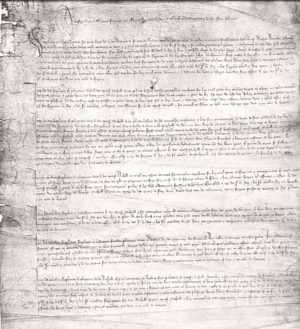
When Exton's term ended in October 1388, King Richard II wanted him to continue as Mayor. However, Exton's support for the King might have made Londoners distrust him. Just before his mayoralty ended, Parliament formally pardoned Exton for any possible wrongdoings. This Parliament also forbade Londoners from criticizing him for supposedly harming the city's freedoms.
There was a rumor that Exton tried to risk London's freedoms by asking Parliament to make Robert Knolles captain of the city. The Cutlers' Company even asked that Exton and others in his government be removed and prosecuted for working with Brembre. The Cutlers suggested that Brembre had personally chosen Exton to replace him and continue Brembre's "falsehood and extortions." This meant that London's government continued to be held "by conquest and mastery," which was against the city's tradition of free elections. The Cordwainers' Guild and many other craft guilds also made similar petitions.
The Lords replied that Exton had been questioned and they found he had not tried to harm the city's liberties. It's possible that other important political issues distracted the Lords from pursuing the case against Exton. They might have taken a practical approach because Exton was still in office. Their lack of action might also have been part of a deal where they protected Exton in return for him abandoning Brembre. Exton likely feared that his past good relations with the King could turn the rebels against him.
Later Career
Exton continued to receive royal favor. For example, he gained control of several estates in Kent and became Constable of Northampton Castle in 1387. He later exchanged this for a royal pension of 6 pence per year. Exton also received payment for debts Brembre owed him, totaling £450, which was a large sum. He also received a Spanish sword from the King and was allowed to buy many of Brembre's personal belongings.
However, in 1392, he angered the King during Richard's "quarrel with the city" and was temporarily out of favor. During this time, he still held his position as a customs collector.
Richard II advised the City in 1388 to choose a "trusty and loyal" mayor, meaning loyal to him. However, the election of Nicholas Twyford was probably not pleasing to the King. Twyford had been defeated by Brembre in 1384 and had often opposed Exton. The "Merciless Parliament" that year also took away London's right to control the retail sale of goods.
In 1390, Exton finally lost his position as collector of the wool tax, which he had held since 1386. Although his guild had regained their official civic rights in 1383, they did not get back their full trading rights until 1399, long after Exton left office.
There were no more loans from the city to the King after Exton's time as Mayor until September 1397.
In 1392, the King began a series of attacks on the city's freedoms. Five years later, when a Mayor died, the King simply appointed his own candidate, Richard Whittington, instead of allowing an election.
Death and Legacy
Nicholas Exton died in 1402. Not much is known about his last years, just as little is known about his youth. He was married twice, first to Katherine around 1382, and later to Johanna (also called Joan). In 1389, Nicholas and Joan received the manor of Hill Hall in Theydon Mount. In 1390, they were allowed to create a chantry (a place for prayers) in the local church.
It is unclear if he had any children. Some historians say no children are recorded. Others suggest he had a daughter named Agnes, who became the ward of John Wade. Exton made a will in 1399, leaving property to his brother and the rest to the local church for masses and prayers.
He may have been related to a contemporary M.P., Thomas Exton, who was a Common Councillor and a prominent goldsmith. Nicholas Exton named John Wade as one of his executors. Wade was a close friend and business partner. Exton was a wealthy man, and the inheritance Wade held for Agnes must have been substantial. Agnes may have later married the son of Richard Pavy.
Exton was a "partisan figure" in London politics, meaning he strongly supported certain groups. However, he was also part of a ruling group whose shared interests often brought stability. He managed to navigate a difficult political time without much harm to himself or the city, even though he sometimes allied with the King and sometimes with his opponents.
Some historians see Exton as someone who tried to stay out of trouble. Others believe he remained loyal to the King but couldn't go against the general feeling of his fellow citizens. A darker view suggests Exton was a powerful man who needed to be reminded not to put his own interests above the community. Either way, Exton's approach was likely one of non-alignment or "opportunistic neutrality."
Exton's career shows how political turmoil could lead to social mobility. In 1382, he was almost imprisoned, but four years later, he held the highest office in the city. His career also shows how much the King could interfere in London's government.
Nicholas Exton is also the name of the murderer of Richard II in Shakespeare's play Richard III. Shakespeare changed the character's first name to Piers. The playwright got his information from earlier writers who might have taken it from Jean Creton. Creton wrote an account of Richard II's removal and death between 1401 and 1402. However, the known Extons at that time, including Nicholas, are not believed to have been the killer. Some think "Exton" might have been a mistake for "Bukton," referring to Sir Peter Buckton, who was Constable of Knaresborough Castle, near where the King died.
National politics remained divided and unstable after Exton's mayoralties, and so did London's city politics.
Images for kids
-
TNA, document SC 8/19/915C: In 1385, King Richard II issued this summons to the sheriffs of London, Nicholas Exton and John Fresshe, requesting them to find and to bring Edmund Fraunceys and his wife Idonia before the King's council on a charge of attempting to defraud University College, Oxford.
 | William Lucy |
 | Charles Hayes |
 | Cleveland Robinson |


